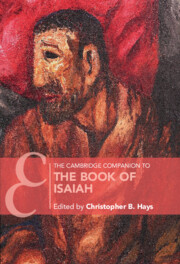Book contents
- The Cambridge Companion to the Book of Isaiah
- Frontispiece
- Cambridge Companions to Religion
- The Cambridge Companion to the Book of Isaiah
- Copyright page
- Contents
- Notes on Contributors
- Acknowledgments
- Timeline of Events Related to the Book of Isaiah
- Abbreviations
- Maps
- 1 Introduction
- Part I The Book of Isaiah Through History
- Part II Isaiah in Its Cultural World
- Part III Isaiah as Literature
- Part IV Afterlives of the Book of Isaiah
- 16 Theological Tensions in the Book of Isaiah
- 17 The Ethical and Political Vision of Isaiah
- 18 Isaiah in the New Testament
- 19 Impressions of Isaiah in Classical Rabbinic Literature
- 20 The Reception History of Isaiah
- Scripture Index
- Other Texts Index
- Subject Index
- Cambridge Companions to Religion ()
- References
16 - Theological Tensions in the Book of Isaiah
from Part IV - Afterlives of the Book of Isaiah
Published online by Cambridge University Press: 08 November 2024
- The Cambridge Companion to the Book of Isaiah
- Frontispiece
- Cambridge Companions to Religion
- The Cambridge Companion to the Book of Isaiah
- Copyright page
- Contents
- Notes on Contributors
- Acknowledgments
- Timeline of Events Related to the Book of Isaiah
- Abbreviations
- Maps
- 1 Introduction
- Part I The Book of Isaiah Through History
- Part II Isaiah in Its Cultural World
- Part III Isaiah as Literature
- Part IV Afterlives of the Book of Isaiah
- 16 Theological Tensions in the Book of Isaiah
- 17 The Ethical and Political Vision of Isaiah
- 18 Isaiah in the New Testament
- 19 Impressions of Isaiah in Classical Rabbinic Literature
- 20 The Reception History of Isaiah
- Scripture Index
- Other Texts Index
- Subject Index
- Cambridge Companions to Religion ()
- References
Summary
With its many voices that are joined together, Isaiah is akin to a massive choir or symphony, and it sometimes strikes dissonant notes. Matthew R. Schlimm, in “Theological Tensions in the Book of Isaiah,” looks at a number of different themes on which the book contains contrasting testimonies: God is portrayed as both a loving savior and a wrathful punisher; God is said to be a mighty sovereign, and yet humans frequently do not act according to his will; God is universal and transcendent, and yet is also portrayed as intimate with his people, particularly Zion; humans are sometimes seen as pervasively sinful, but are exhorted to do good; the creation, too, is sometimes good and blessed, and yet elsewhere seen as corrupted; and the same leaders and empires are alternately condemned and used as divine agents. Schlimm reflects on the way in which these complexities press readers beyond simple answers.
- Type
- Chapter
- Information
- The Cambridge Companion to the Book of Isaiah , pp. 261 - 280Publisher: Cambridge University PressPrint publication year: 2024

